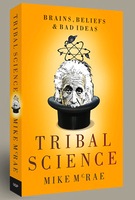If you’d been in one of my senior biology classes, chances were you would have had the question ‘Which came first; the chicken or the egg?’ as a complex reasoning question on one of your mid-semester exams. I found it to be a great way of assessing the student’s understanding of principles of evolution.
To get full marks, the student had to comprehend that somewhere during the ancestry of the species we call ‘chickens’ today, there came sufficient evolutionary change to warrant a new species. In other words, while this precise point might be debatable as far as what defines a species, a bird-thing that couldn’t be called a chicken produced an egg, from which hatched something with the characteristics of the modern chook. Even if the students didn’t get that far, they’d get a mark or two for realising that the egg defines a characteristic of the embryonic bird.
Now, as a science writer, I completely sympathise with a journalist’s desire to use a lede or a heading that draws the attention of an audience that is too often intimidated by anything that sounds overly ‘sciency’. The age-old pseudophilosophical ‘which came first’ conundrum is a light-hearted riddle that most of us find to be familiar. If only it made sense in this particular case, with such head-scratching headers as They’ve cracked it at last! The chicken DID come before the egg and Scientists think chicken came first, I might have merely ignored it as another cheesy attempt at making science look appealing.
The science behind the story is actually quite interesting; British chemists at the University of Sheffield and the University of Warwick developed a computer model showing that egg shell production is reliant on a protein called ovocleidin-17 which serves as a catalyst, creating a nucleus for calcium carbonate particles to crystalise and form the egg’s hard shell. Not exactly the cure to cancer or alien contact, but not the most boring discovery to have ever been uncovered in a laboratory.
But what does this have to do with the chicken coming first? Is it presuming the early embryo is an eggless chicken, and it’s only with the latter formation of a hard shell that we can say the egg then develops? Perhaps…but for a gimmick headline, it is an unnecessary addition that risks confusion for the sake of an ice breaker. Worse still, in situations such as these, the line between a glib, light-hearted angle and a serious scientific question can be blurred. While I’m no longer teaching, I can almost imagine a student earnestly presenting such a headline as serious evidence for ‘chickens coming first’, not understanding that the research and the riddle are as related as a knock-knock joke and the science of acoustics.
Nobody says science always has to be serious. Humour can be extremely effective at grabbing attentions. From the popularity of the angle’s use throughout the media, it’s easy to presume it was lifted straight from the press release, and few journalists (in their rush for a deadline) would be tempted to spend precious moments considering an alternative. But the cost is misrepresentation of otherwise good science and public confusion over the real issues that scientists deal with.


Improvements in science reporting I can’t see getting any better in the near future indeed I think that, its a warning of what will/is/has happened to other serious topics.
I want to read http://embiggenbooks.com/flat-earth-news.html but I am not sure I have the heart at the moment.